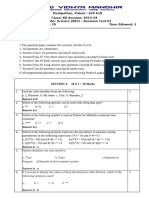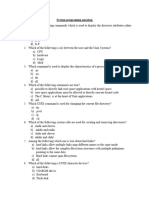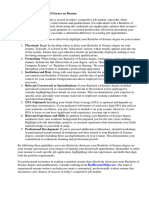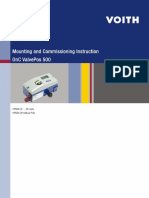0 ratings0% found this document useful (0 votes)
142 viewsEmbedded Linux On Arm 9 & Python
This document contains multiple choice and essay questions about embedded Linux on ARM 9 and Python. The questions cover topics such as Linux system calls, file systems, process management, GCC commands, Makefiles, Python data types, operators, modules, and control flow statements. There are also questions about pipes, message queues, dictionaries, lists, and implementing a calculator program in Python.
Uploaded by
Sidhin SanthoshCopyright
© © All Rights Reserved
We take content rights seriously. If you suspect this is your content, claim it here.
Available Formats
Download as DOCX, PDF, TXT or read online on Scribd
0 ratings0% found this document useful (0 votes)
142 viewsEmbedded Linux On Arm 9 & Python
This document contains multiple choice and essay questions about embedded Linux on ARM 9 and Python. The questions cover topics such as Linux system calls, file systems, process management, GCC commands, Makefiles, Python data types, operators, modules, and control flow statements. There are also questions about pipes, message queues, dictionaries, lists, and implementing a calculator program in Python.
Uploaded by
Sidhin SanthoshCopyright
© © All Rights Reserved
We take content rights seriously. If you suspect this is your content, claim it here.
Available Formats
Download as DOCX, PDF, TXT or read online on Scribd
You are on page 1/ 3
EMBEDDED LINUX ON ARM 9 & PYTHON
Multiple choice questions
1) Gcc –c myprog.c will create the
a) Pre processor file
b) Assembly file
c) Object file
d) Library file
2) What is the output of following command?
$gcc –E myprog.c >file1
a) Error description of the command will moved to file1
b) Object file is moved to the file1
c) Preprocessor output file will moved to the file1
d) None of these
3) Which symbol is user to create comment in Make file?
a) //
b) %
c) $
d) #
4) From the below which interface is not a part of Linux kernel?
a) System call interface
b) Process management
c) BIOS management system
d) Memory management
e) Virtual file system
5) Which is exceptional in this group?
a) open()
b) creat()
c) fork()
d) write()
e) read()
6) The system call exit () is
a) a File system related system call
b) a Process related system call
c) A Input/output system call
d) Not a system call
7) What is the return value of fork in a child process?
a) Process id of child process
b) 0
c) -1
d) Any positive integer
8) What is called as named pipe?
a) PIPE system call it self
b) FIFO
c) Message Queue
d) Shared memory
9) Which key will generate SIGINIT signal
a) ^c
b) ^z
c) ^\
d) Esc
10) Which is the process with process id 1?
a) Kernel
b) Init
c) Boot process
d) Any orphan process
11) The first sector of an HDD called
a) DBR
b) Primary drive
c) Landing zone
d) MBR Enable support for the Kernighan and Ritchie C syntax
__________________________________________________________________________
FILL IN THE BLANKS
1. The statement similar to NULL operation in python is _____.
2.______ returns control to beginning of while loop.
3. Function that returns current cursor position is___.
4. To read a line from standard input and to return it as a string _____ function is used.
5. C+=a implies_____.
6. The floor division operator is_____.
7. The data type of count=10 is____.
8. The membership operators in python are_____.
9. Blocks of codes are denoted by __________.
10.______ is a standard data type in python.
____________________________________________________________________________
Answer the following (4 marks each)
1. Write a short note on pipes
2. Explain about message queue mechanism
3. What is a make file?
4. Explain dictionary in PYTHON.
5. Explain PYTHON membership operators.
6. What are BREAK & CONTINUE statements?
7. How do you import modules in PYTHON?
8. Explain list in PYTHON.
9. Briefly explain comparison operators in PYTHON.
10. What is a file system?
11. Define the system call wait () and open() ?
12. Define a shell
________________________________________________________________________
Essay type question
1. Explain the standard datatypes in PYTHON.
2. Explain various operators in PYTHON
3. Explain any 10 file I/O functions in PYTHON.
4. Briefly explain any 3 conditional statements in PTYHON.
5. Implement a calculator in PYTHON.
6. Explain different kernel architectures with block diagram.
You might also like
- Cummins Onan DGFB Generator Set With Power Command 2100 Controller Service Repair Manual PDF0% (1)Cummins Onan DGFB Generator Set With Power Command 2100 Controller Service Repair Manual PDF16 pages
- Project +Sweta+Kumari+ +FRA+Milestone+1+ July+ 2021100% (2)Project +Sweta+Kumari+ +FRA+Milestone+1+ July+ 202131 pages
- Master of Computer Applications Second Year: Unix LabNo ratings yetMaster of Computer Applications Second Year: Unix Lab15 pages
- Unit 12 - Quiz#5: PMGT 550-90 - O-2020:Late Summer - Quality Management andNo ratings yetUnit 12 - Quiz#5: PMGT 550-90 - O-2020:Late Summer - Quality Management and10 pages
- 12 Cs Final Mock Objective Type July 2021No ratings yet12 Cs Final Mock Objective Type July 202110 pages
- 10 - 19UCSPC402 - A - 7 - 32unit - 5 - 5 - Application Solved (OS)No ratings yet10 - 19UCSPC402 - A - 7 - 32unit - 5 - 5 - Application Solved (OS)12 pages
- Full download Starting Out with Python 4th Edition Gaddis Test Bank pdf docx100% (11)Full download Starting Out with Python 4th Edition Gaddis Test Bank pdf docx34 pages
- Data File Handling in Python Class 12 - McqsNo ratings yetData File Handling in Python Class 12 - Mcqs5 pages
- University of Engineering & Technology, Taxila: Class: BS - CS (4th) Term: Final Term SP 2019No ratings yetUniversity of Engineering & Technology, Taxila: Class: BS - CS (4th) Term: Final Term SP 20193 pages
- Rev 1 _ q With Ans _python Basics and Flow Control 17.08.24No ratings yetRev 1 _ q With Ans _python Basics and Flow Control 17.08.247 pages
- Victoria Public SR Sec School Class 12 - Computer ScienceNo ratings yetVictoria Public SR Sec School Class 12 - Computer Science9 pages
- Linux and OS Question SEM FINAL QUESTION BANKNo ratings yetLinux and OS Question SEM FINAL QUESTION BANK65 pages
- Programming in Python Mcqs With Answers (2022) CsdNo ratings yetProgramming in Python Mcqs With Answers (2022) Csd63 pages
- File Handling Mcqs 1. To Open A File C:/test - TXT For Reading, We Should Give TheNo ratings yetFile Handling Mcqs 1. To Open A File C:/test - TXT For Reading, We Should Give The19 pages
- File Handling Mcqs 1. To Open A File C:/test - TXT For Reading, We Should Give TheNo ratings yetFile Handling Mcqs 1. To Open A File C:/test - TXT For Reading, We Should Give The19 pages
- Systems Programming Midterm Fall 2017 AnswersNo ratings yetSystems Programming Midterm Fall 2017 Answers10 pages
- Placement Test Questions & Answers Unix and NetworkingNo ratings yetPlacement Test Questions & Answers Unix and Networking5 pages
- BE Computer and IT Advanced Unix Programming, Artificial Intelligence and Expert SystemNo ratings yetBE Computer and IT Advanced Unix Programming, Artificial Intelligence and Expert System41 pages
- Machine Learning Data Mining Using Python -UBCC5001No ratings yetMachine Learning Data Mining Using Python -UBCC500112 pages
- Autumn Durald Arkapaw, ASC: Black Panther: Wakanda ForeverNo ratings yetAutumn Durald Arkapaw, ASC: Black Panther: Wakanda Forever102 pages
- Henri Cartier-Bresson - Tete-a-Tete (Portraits)No ratings yetHenri Cartier-Bresson - Tete-a-Tete (Portraits)123 pages
- Effective Subgrade Coefficients For Seismic Performance Assessment of Pile FoundationsNo ratings yetEffective Subgrade Coefficients For Seismic Performance Assessment of Pile Foundations10 pages
- Lifting Equipment Inspection and Maintenance80% (5)Lifting Equipment Inspection and Maintenance36 pages
- Computer System: Classification of Computers by SizeNo ratings yetComputer System: Classification of Computers by Size25 pages
- Make 3d CAD Model of Spiral Bevel.115110106No ratings yetMake 3d CAD Model of Spiral Bevel.11511010614 pages
- Manual - Usuario Vierik S.A.S. Solution'sNo ratings yetManual - Usuario Vierik S.A.S. Solution's11 pages
- Failure Analysis and Principles InvolvedNo ratings yetFailure Analysis and Principles Involved29 pages
- Interfacing Seven Segment Display To 8051No ratings yetInterfacing Seven Segment Display To 80517 pages
- Perancangan Aplikasi Pencatatan Transaksi Keuangan Dan Inventory Berbasis Android Distributor Produk MSL PurbalinggaNo ratings yetPerancangan Aplikasi Pencatatan Transaksi Keuangan Dan Inventory Berbasis Android Distributor Produk MSL Purbalingga7 pages
- 11 Features Every Monitoring & Evaluation Software Should Have - TolaDataNo ratings yet11 Features Every Monitoring & Evaluation Software Should Have - TolaData2 pages
- Operation and Simulation of Three Phase Inverter With 120°, 150° and 180° Conduction ModeNo ratings yetOperation and Simulation of Three Phase Inverter With 120°, 150° and 180° Conduction Mode7 pages
- Mounting and Commissioning Instruction Onc Valvepos 500: Vp500 (4 ... 20 Ma) Vp500 (Profibus Pa)No ratings yetMounting and Commissioning Instruction Onc Valvepos 500: Vp500 (4 ... 20 Ma) Vp500 (Profibus Pa)30 pages
- VT1682 Console and One Bus 8+ 16 Systme: General DescriptionNo ratings yetVT1682 Console and One Bus 8+ 16 Systme: General Description7 pages
- Sinhgad Institute of Management, Pune-41: Assignment No.4No ratings yetSinhgad Institute of Management, Pune-41: Assignment No.42 pages
- Plan and Prepare Your Environment For FileNet P8No ratings yetPlan and Prepare Your Environment For FileNet P8206 pages
































































































